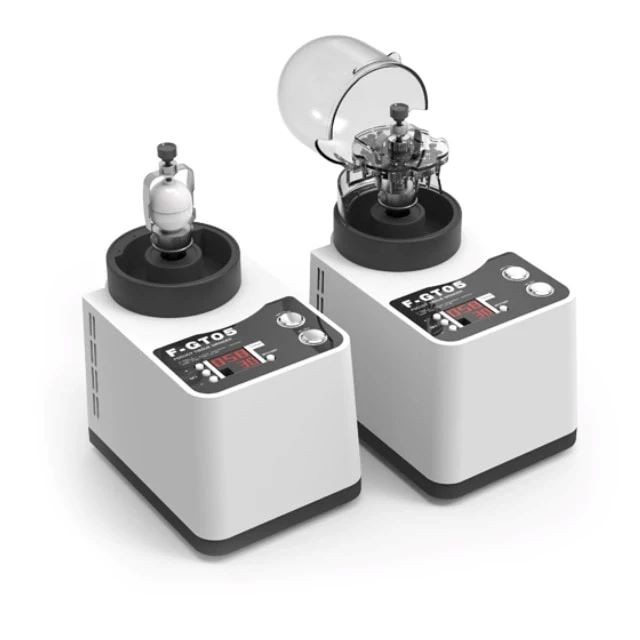
Milling Equipment
Laboratory Micro Tissue Grinding Mill Grinder
Item Number : KT-MT10
Price varies based on specs and customizations
- Maximum injection size
- < 6 mm
- Sample particle size range
- 0.1-20 um
- Range of motion
- 12mm
- Movement frequency
- 3000 times/min
Shipping:
Contact us to get shipping details Enjoy On-time Dispatch Guarantee.
Why Choose Us
Easy ordering process, quality products, and dedicated support for your business success.
Introduction
KT-MT10 is a miniature ball mill with a compact structure design. The width and depth are only 15X21 cm, and the total weight is only 8 kg. It can be used with a minimum 0.2ml centrifuge tube or a maximum 15ml ball mill jar. Efficiency in the field of micro-sample grinding, which solves the problem of poor treatment effect of sticking pots and balls in the processing of single-gram or multi-gram micro-level samples, and maximizes the processing effect. It can be applied to laboratory cell tissue breaking and powder grinding analysis; K- MT10 has no complicated program setting, and the simple PLC time control system can realize the functions of continuous and intermittent grinding and timing start grinding. Crushing, grinding and mixing effects.
- Processing principle: impact force
- Application sample characteristics: fine | low to medium hardness | brittle | dry or wet
- Processing Type: Grinding | Blending
- Function: continuous operation | intermittent operation | timing operation | timing start | power failure memory
Applications
The Micro Tissue Grinder is a versatile laboratory tool designed for grinding, homogenizing, and mixing various materials under different conditions, including dry, wet, and cryogenic environments. Its application extends across multiple scientific disciplines, making it an essential instrument for sample preparation in research and development. Here are the main application areas of the Micro Tissue Grinder:
- Biological Research: Ideal for grinding tissues, cells, and biological samples for molecular and cellular analysis.
- Pharmaceutical Analysis: Used for grinding medicinal herbs, drugs, and chemical products to prepare samples for quality control and efficacy testing.
- Geological Studies: Effective in grinding minerals, rocks, and soil samples for mineralogical and geochemical analyses.
- Food Science: Utilized for grinding grains, fruits, oils, and other food products for nutritional analysis and quality assessment.
- Forensic Science: Helps in grinding materials like hair, bones, and fibers for forensic analysis and evidence testing.
- Materials Science: Used for grinding ceramics, plastics, and other materials for testing their mechanical and physical properties.
- Environmental Science: Essential for grinding samples of waste, slag, and other environmental materials for analysis and monitoring.
- Agricultural Research: Useful for grinding seeds, plants, and grains for agricultural studies and seed viability tests.
These applications highlight the Micro Tissue Grinder's flexibility and effectiveness in handling a wide range of materials, ensuring precise and efficient sample preparation across various scientific fields.
Features
The Micro Tissue Grinder is a specialized laboratory tool designed to handle the delicate task of grinding small tissue samples. This instrument is particularly beneficial for researchers and scientists who require precise and efficient sample preparation for various applications, including biological and pharmaceutical research. The features of the Micro Tissue Grinder are tailored to ensure that even the smallest and most sensitive samples are processed with minimal loss of integrity and maximum efficiency.
- Precision Grinding for Small Samples: The Micro Tissue Grinder is designed to handle very small amounts of material, even as small as a single leaf. This precision is crucial for maintaining sample integrity and ensuring accurate results in research.
- Versatility in Sample Types: Capable of grinding or homogenizing a wide range of materials, including wet, soft, brittle, elastic, hard, dry, and fibrous substances. This versatility makes it an essential tool for laboratories dealing with diverse sample types.
- Minimal Heat and Shear Effects: Unlike traditional mechanical grinders, this tool utilizes a design that minimizes heat and shear-related anomalies, which is particularly important for heat-sensitive materials such as pharmaceuticals and foods.
- User-Friendly and Safe Operation: Features an intuitive control system and ergonomic design, ensuring that the grinding process is smooth and safe. This reduces the risk of accidents or sample contamination, providing peace of mind to researchers.
- Customizable and Efficient: Offers interchangeable liners and a personalized design to meet specific grinding needs. The automatic control system enhances efficiency, making it a cost-effective solution for research and development.
- Compact and Easy to Maintain: With a small footprint, it optimizes space utilization in the lab. The easy disassembly and cleaning, facilitated by quick couplings, ensure that the equipment remains in optimal condition with minimal downtime.
These features collectively enhance the Micro Tissue Grinder's utility in various scientific disciplines, making it a valuable asset in any laboratory focused on precise and efficient sample preparation.
Detail & Parts
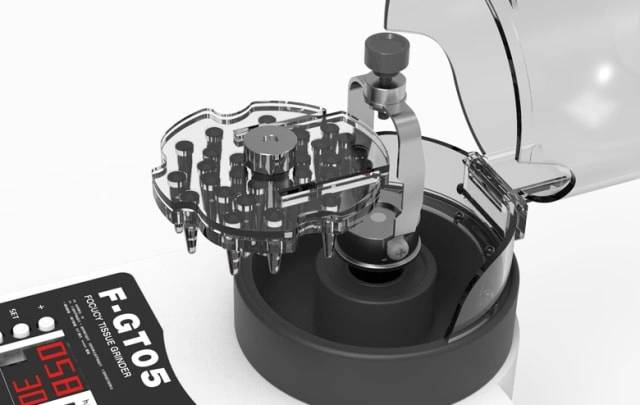
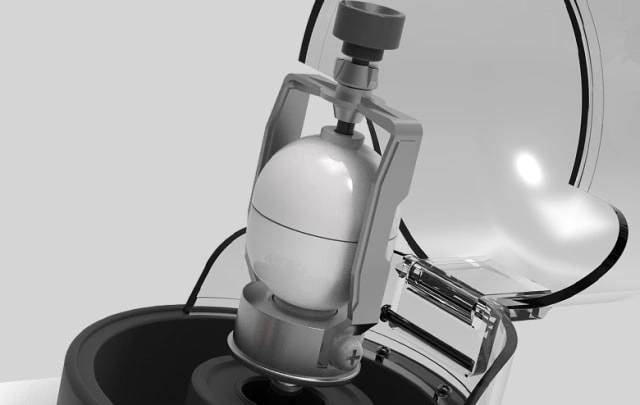

Advantages
The Micro Tissue Grinder offers a range of advantages that make it an essential tool in various industries, including pharmaceuticals, food processing, agriculture, and chemicals. Here are some of the key benefits:
- Versatile Sample Preparation: The Micro Tissue Grinder is capable of handling a wide variety of samples, from hard and brittle to soft and pasty materials. This versatility ensures that it can meet the diverse needs of different industries, providing a comprehensive solution for sample preparation.
- Efficient and High-Quality Grinding: With the ability to achieve fine particle sizes and tight distributions, the Micro Tissue Grinder outperforms other milling methods. It ensures high-quality grinding results, which is crucial for maintaining product quality and consistency in research and analysis.
- Minimal Risk of Contamination: Unlike traditional mills, the Micro Tissue Grinder does not use knives, blades, or other parts that can wear and contaminate samples. Its simple chamber design is easy to clean, significantly reducing the risk of cross-contamination.
- Preservation of Material Integrity: The grinder operates without causing temperature changes, making it ideal for heat-sensitive materials such as those used in cosmetics. This feature ensures that the original properties of the materials are preserved during the grinding process.
- Customizable and User-Friendly: The Micro Tissue Grinder comes with interchangeable liners and an automatic control system, allowing for personalized design solutions. It is easy to disassemble and clean, with a small footprint that optimizes space utilization in the lab.
- Cost-Effective and Time-Saving: By offering a fast and efficient grinding process, the Micro Tissue Grinder significantly reduces the time and cost associated with sample preparation. This efficiency leads to increased productivity and substantial savings in labor and resources.
- Reproducibility and Consistency: The controlled grinding process ensures reproducible and consistent results, minimizing variations and ensuring reliable outcomes. This consistency is vital for quality control, research, and production processes across various industries.
- Safety Features: Equipped with safety interlock systems and ergonomic designs, the Micro Tissue Grinder prioritizes operator protection, minimizing the risk of accidents or injuries during operation.
These advantages make the Micro Tissue Grinder a valuable asset for any laboratory or industrial setting requiring precise, efficient, and contamination-free sample preparation.
Technical specifications
| Maximum injection size | < 6 mm |
| Sample particle size range | 0.1-20 um |
| Grinding method | Dry grinding | wet grinding | low temperature grinding |
| Operating principle | 8-track high-frequency three-dimensional movement |
| Range of motion | 12mm |
| Movement frequency | 3000 times/min |
| Grinding carrier type | Ball mill jar | cell disruption adapter |
| Ball mill material | Tungsten carbide | zirconia | stainless steel | polytetrafluoroethylene, etc. optional |
| Number of ball mill jars | 1 |
| Ball mill jar volume | 15 ml |
| Grinding Ball Material | Zirconia | Stainless Steel | Tungsten Carbide Optional |
| Grinding ball size | 0.1-15mm |
| Configurable centrifuge tube volume | 0.2ml | 0.5ml | 2ml | 5ml |
| Cell breaking adapter | 0.2mlX25 | 0.5mlX12 | 2mlX5 | 5mlX4 |
| Electrical description | 200-240V AC, 50-60Hz, 30W |
| Power port | National Standard | European Standard | American Standard | British Standard, etc. |
| Net weight | 8kg |
| Dimensions (width, depth and height) | 50*210*220 mm |
| Protection class | IP65 |
| Standard | CE |
| Additional items | Transparent PC protective cover, liquid nitrogen dry ice cooling |
Warnings
Operator safety is the top important issue! Please operate the equipment with cautions. Working with inflammable& explosive or toxic gases is very dangerous, operators must take all necessary precautions before starting the equipment. Working with positive pressure inside the reactors or chambers is dangerous, operator must fellow the safety procedures strictly. Extra caution must also be taken when operating with air-reactive materials, especially under vacuum. A leak can draw air into the apparatus and cause a violent reaction to occur.
Designed for You
KinTek provide deep custom made service and equipment to worldwide customers, our specialized teamwork and rich experienced engineers are capable to undertake the custom tailoring hardware and software equipment requirements, and help our customer to build up the exclusive and personalized equipment and solution!
Would you please drop your ideas to us, our engineers are ready for you now!
Trusted by Industry Leaders

FAQ
What Is A Laboratory Ball Mill?
What Is A Laboratory Crusher Used For?
How Does The Micro Tissue Grinder Maintain Sample Integrity?
What Are The Key Features Of The Micro Tissue Grinder?
What Are The Applications Of A Laboratory Ball Mill?
How Does A Laboratory Crusher Work?
What Are The Main Types Of Laboratory Ball Mills?
What Are The Main Features Of A Laboratory Jaw Crusher?
What Is The Working Principle Of A Laboratory Ball Mill?
What Is The Working Principle Of A Laboratory Jaw Crusher?
What Are The Advantages Of Using A Laboratory Ball Mill?
What Are The Advantages Of Using A Laboratory Crusher?
What Materials Can Be Processed Using A Laboratory Ball Mill?
What Are The Key Features Of A High-energy Planetary Ball Mill?
What Is The Difference Between A Planetary Ball Mill And A Vibratory Ball Mill?
4.8 / 5
This micro tissue grinder is a lifesaver! It's so easy to use and clean, and it grinds samples quickly and efficiently.
4.7 / 5
I'm a lab manager and I recently purchased the micro tissue grinder. I'm very impressed with the quality and durability of the product. It's a great value for the price.
4.9 / 5
I've been using the micro tissue grinder for a few months now and I'm very happy with it. It's a great tool for grinding small samples and it's very easy to use.
4.6 / 5
The micro tissue grinder is a great addition to our lab. It's very efficient and grinds samples quickly and easily. I highly recommend it.
4.8 / 5
I'm a researcher and I use the micro tissue grinder to grind samples for my experiments. It's a great tool and I'm very happy with it.
4.7 / 5
I'm a lab technician and I use the micro tissue grinder to grind samples for analysis. It's a great tool and it's very easy to use.
4.9 / 5
I'm a scientist and I use the micro tissue grinder to grind samples for my research. It's a great tool and I'm very happy with it.
4.6 / 5
I'm a lab manager and I recently purchased the micro tissue grinder. I'm very impressed with the quality and durability of the product. It's a great value for the price.
REQUEST A QUOTE
Our professional team will reply to you within one business day. Please feel free to contact us!
Related Products

Laboratory Hybrid Tissue Grinding Mill
KT-MT20 is a versatile laboratory device used for rapid grinding or mixing of small samples, whether dry, wet, or frozen. It comes with two 50ml ball mill jars and various cell wall breaking adapters for biological applications such as DNA/RNA and protein extraction.
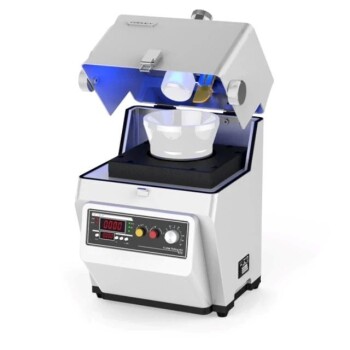
Laboratory Grinding Mill Mortar Grinder for Sample Preparation
KT-MG200 mortar grinder can be used for mixing and homogenizing powder, suspension, paste and even viscous samples. It can help users realize the ideal operation of sample preparation with more regularization and higher repeatability.
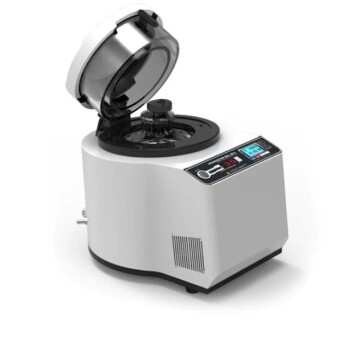
Laboratory High Throughput Tissue Grinding Mill Grinder
KT-MT is a high-quality, small, and versatile tissue grinder used for crushing, grinding, mixing, and cell wall breaking in various fields, including food, medical, and environmental protection. It is equipped with 24 or 48 2ml adapters and ball grinding tanks and is widely employed for DNA, RNA, and protein extraction.
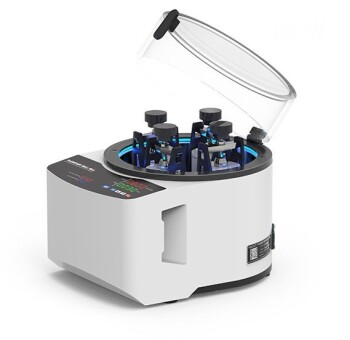
Mini Planetary Ball Mill Machine for Laboratory Milling
Discover the KT-P400 desktop planetary ball mill, ideal for grinding and mixing small samples in the lab. Enjoy stable performance, long service life, and practicality. Functions include timing and overload protection.

Laboratory Single Horizontal Jar Mill
KT-JM3000 is a mixing and grinding instrument for placing a ball milling tank with a volume of 3000ml or less. It adopts frequency conversion control to realize timing, constant speed, direction change, overload protection and other functions.
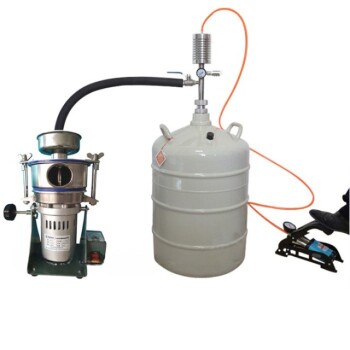
Small Cryogenic Grinder Cryomill Cryogrinder with Liquid Nitrogen for Laboratory Use
Our KINTEK Cryomilling is perfect for small runs and R&D trials. With a versatile cryogenic system, it can handle a variety of materials, including plastics, rubber, pharmaceuticals, and food grades. Plus, our specialized hydraulic laboratory crushers ensure accurate results through multiple passes, making it suitable for XRF analysis. Get finely-powdered samples with ease!
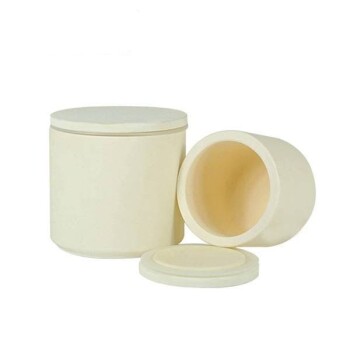
Laboratory Jar Ball Mill with Alumina Zirconia Grinding Jar and Balls
Grind to perfection with alumina/zirconia grinding jars and balls. Available in volume sizes from 50ml to 2500ml, compatible with various mills.
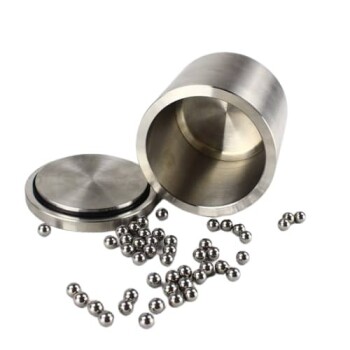
Laboratory Ball Mill Jar Mill with Metal Alloy Grinding Jar and Balls
Grind and mill with ease using metal alloy grinding jars with balls. Choose from 304/316L stainless steel or tungsten carbide and optional liner materials. Compatible with various mills and features optional functions.
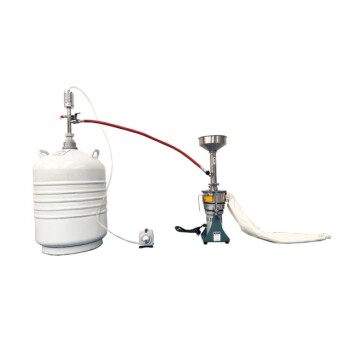
Liquid Nitrogen Cryogenic Grinder Mill Cryomill Airflow Ultrafine Pulverizer
Discover the Liquid Nitrogen Cryogenic Grinding Machine, perfect for lab use, ultra-fine pulverization, and preserving material properties. Ideal for pharmaceuticals, cosmetics, and more.
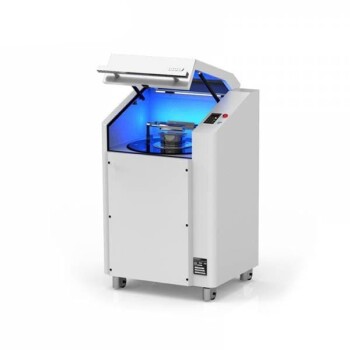
Lab Vibration Mill
Vibration Mill for Efficient Sample Preparation, Suitable for Crushing and Grinding a Variety of Materials with Analytical Precision. Supports Dry / Wet / Cryogenic Grinding and Vacuum/Inert Gas Protection.

High Energy Vibratory Laboratory Ball Mill Grinding Mill Single Tank Type
High-energy vibration ball mill is a small desktop laboratory grinding instrument.It can be ball-milled or mixed with different particle sizes and materials by dry and wet methods.
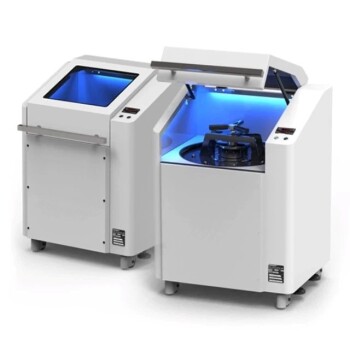
Laboratory Disc Cup Vibratory Mill for Sample Grinding
The vibrating disc mill is suitable for non-destructive crushing and fine grinding of samples with large particle sizes, and can quickly prepare samples with analytical fineness and purity.
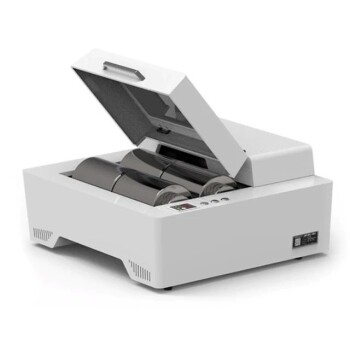
Laboratory Four-Body Horizontal Jar Mill
The four-body horizontal tank mill ball mill can be used with four horizontal ball mill tanks with a volume of 3000ml. It is mostly used for mixing and grinding laboratory samples.
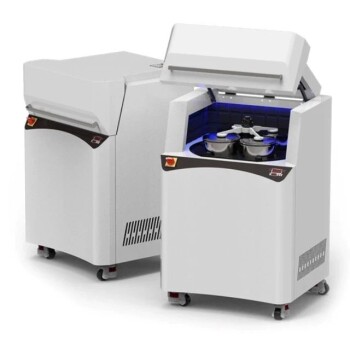
Disc Cup Vibrating Mill Multi-Platform for Lab
The multi-platform vibrating disc mill is suitable for non-destructive crushing and fine grinding of samples with large particle sizes. It is suitable for crushing and grinding applications of medium-hard, high-hard, brittle, fibrous, and elastic materials.

High-Energy Omnidirectional Planetary Ball Mill Milling Machine for Laboratory
The KT-P4000E is a new product derived from the vertical high-energy planetary ball mill with a 360° swivel function. Experience faster, uniform, and smaller sample output results with 4 ≤1000ml ball mill jars.

High Energy Vibratory Laboratory Ball Mill Double Tank Type
High-energy vibration ball mill is a small desktop laboratory grinding instrument. It uses 1700r/min high-frequency three-dimensional vibration to make the sample achieve the result of grinding or mixing.
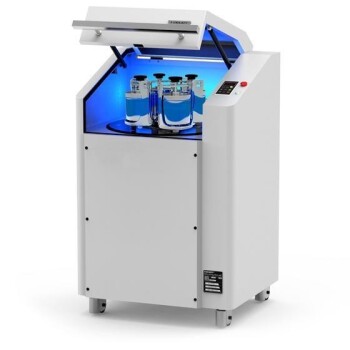
Laboratory Planetary Ball Mill Cabinet Planetary Ball Milling Machine
The vertical cabinet structure combined with ergonomic design enables users to obtain the best comfortable experience in standing operation. The maximum processing capacity is 2000ml, and the speed is 1200 revolutions per minute.
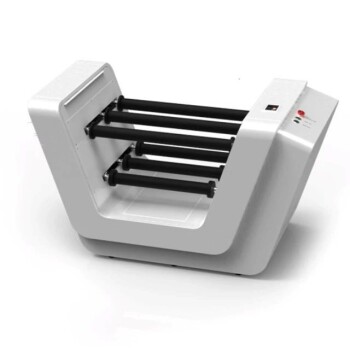
Laboratory Ten-Body Horizontal Jar Mill for Lab Use
The Ten-body horizontal jar mill is for 10 ball mill pots (3000ml or less). It has frequency conversion control, rubber roller movement, and PE protective cover.
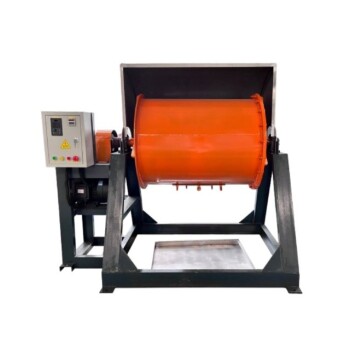
Stainless Steel Laboratory Ball Mill for Dry Powder and Liquid with Ceramic Polyurethane Lining
Discover the versatile stainless steel dry powder/liquid horizontal ball mill with ceramic/polyurethane lining. Ideal for ceramic, chemical, metallurgical, and building materials industries. High grinding efficiency and uniform particle size.
Related Articles

Key Features of the Micro Tissue Grinder: Usage, Advantages, and Applications
Discover the key features of the Micro Tissue Grinder, including usage instructions, advantages, and application fields. Learn the principles and structure of the Micro Tissue Grinder, and explore its benefits in sample preparation and industrial settings.

What is a Laboratory Crusher Used For?
Discover the uses and working mechanism of laboratory crushers. Explore various types of crushing equipment and their applications. Learn how laboratory crushers play a crucial role in scientific analysis and environmental studies.

Laboratory Crushers: A Comprehensive Guide to Their Uses and Functionality
Laboratory crushers play a crucial role in scientific research and analysis. These crushers, commonly known as jaw crushers, are indispensable in obtaining accurate and consistent results for sample preparation.

The Three Stages of Lab Crushing: A Comprehensive Guide
Learn about the three stages of crushing: primary, secondary, and tertiary, and how they are used in sample preparation for scientific analysis. Discover the different types of crushers and their applications in reducing bulky materials into smaller particles.

Features of Different Laboratory Mills: An Overview
Laboratory mills are specialized machines used to reduce non-homogenous batch samples into smaller, representative samples that are more uniform in composition.

Understanding the Dry Bag Cold Isostatic Press Machine by KinTek
Powder metallurgy is a manufacturing route that allows for the production of specific materials, especially for high-performance applications. It reduces material waste and produces parts that are close to the final shape. KinTek's CIP equipment has been successfully used to consolidate most common metals, and there is a growing interest in using it for metal powder processing in a wider range of applications.

Maximizing Grinding Efficiency: The Power of Planetary Ball Mills
Discover why planetary ball mills offer higher grinding efficiency than ordinary ball mills. Learn about the technology behind their high-performance all-round capabilities. Find out the key factors influencing the productivity and specific energy consumption of ball mills.

Development and Principles of Frozen Tissue Crushers
Explore the history, classification, and principles of frozen tissue crushers, including grinding ball selection and how to choose the right crusher.

Laboratory Sample Preparation and Digestion Equipment
Overview of essential lab equipment for sample preparation and digestion.

Application of Ultra-Micro Pulverization Technology in the Food Industry
Explores the benefits and applications of ultra-micro pulverization technology in enhancing food processing and nutrient absorption.

Basic Laboratory Centrifuge Equipment
Overview of different types of centrifuges used in laboratories.